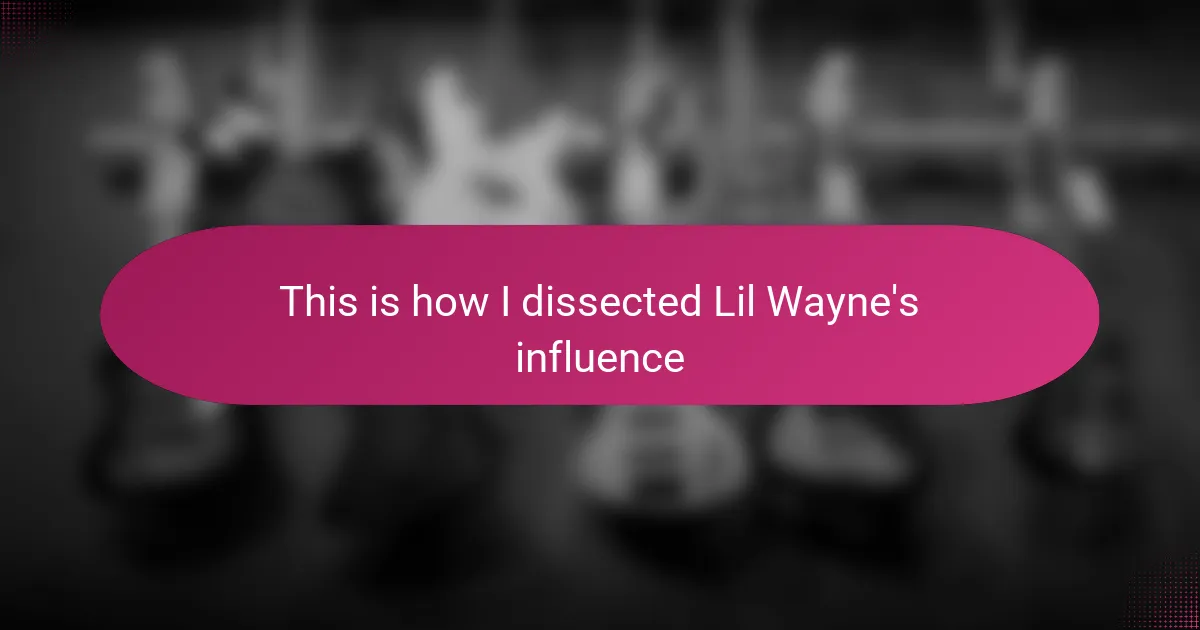Key takeaways
- Rap music influences personal identity and fosters emotional connections through authenticity and relatable themes.
- Lil Wayne redefined rap by merging bravado with vulnerability, showcasing fearless creativity and pushing artistic boundaries.
- His intricate wordplay and storytelling invite listeners to unpack meaning, creating a dialogue that resonates on a personal level.
- Wayne’s impact on rap trends normalized emotional openness, inspiring many artists to embrace authenticity and break traditional molds.
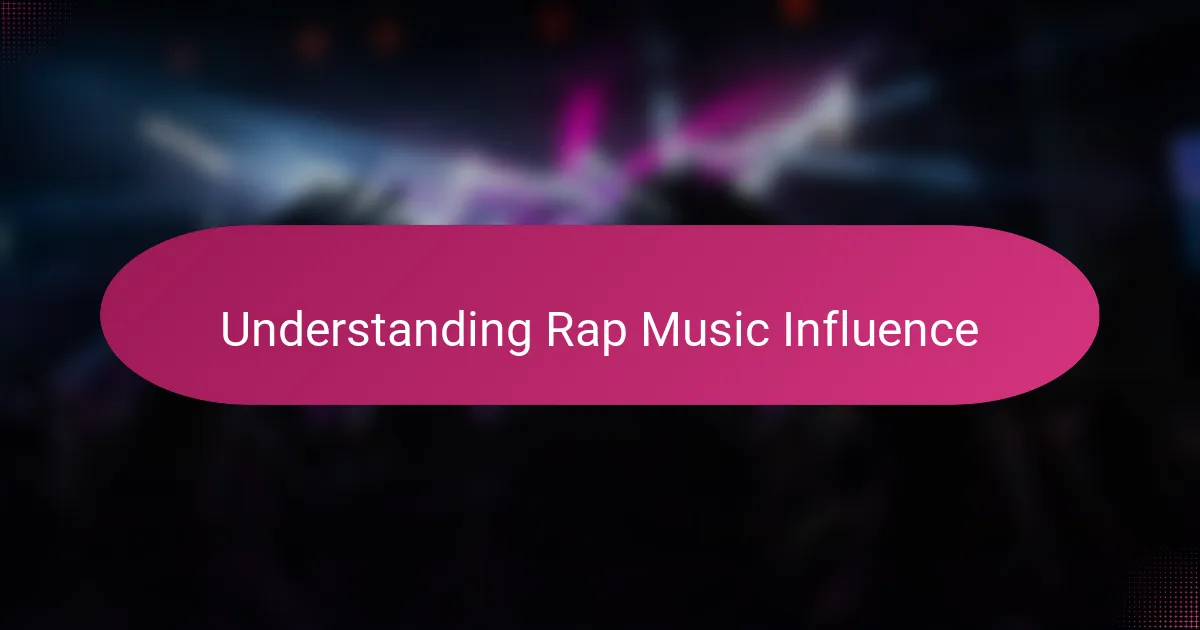
Understanding Rap Music Influence
When I think about rap music influence, I realize it goes beyond just beats and lyrics; it’s about cultural shifts and personal identity. How often do we stop to consider how an artist’s style or message seeps into the way we express ourselves? For me, it’s like tracing the ripple effect of a stone thrown into a pond—you see the initial splash, but it’s the expanding circles that really tell the story.
In my experience, understanding rap influence means recognizing the layers beneath the surface: the social struggles, the language innovation, and the emotional rawness. I’ve noticed that certain lines or flows stick with you not just because they sound good, but because they capture feelings you didn’t know how to express. Doesn’t that connection say something powerful about the role these artists play in shaping more than just music?
Sometimes, I wonder—what really sets one artist’s influence apart from another’s? It’s the authenticity and the risk they take to push boundaries that resonates deeply. When an artist touches on themes that mirror my own life or challenge the status quo, I feel their impact on a whole new level, making their influence undeniable and unforgettable.
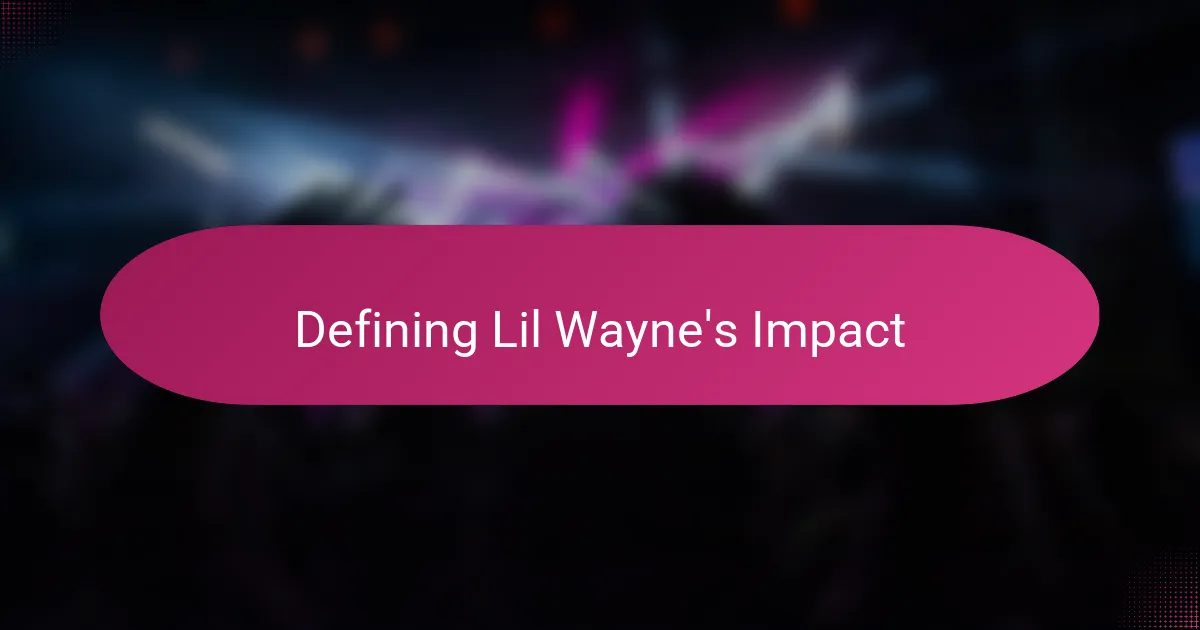
Defining Lil Wayne’s Impact
Lil Wayne’s impact on rap feels like a seismic shift that changed the landscape overnight. I remember hearing his mixtapes and thinking, “This is different—there’s a raw honesty and a cleverness in his wordplay that I hadn’t heard before.” His influence isn’t just in the music; it’s in the way he made bravado and vulnerability coexist seamlessly.
What strikes me most is how Lil Wayne redefined what it means to be a rap artist. He wasn’t just rapping about the usual tropes—he twisted flows, experimented with metaphors, and infused his work with a kind of fearless individuality. That kind of creativity inspires me to look beyond the surface of hip-hop and really appreciate the craft behind it.
Have you ever noticed how certain rappers shape your own style, even subconsciously? For me, Lil Wayne’s impact went beyond sound—it affected my attitude toward creativity and expression. He showed me that being unapologetically yourself, even if it’s unconventional, can resonate powerfully and change the game forever.
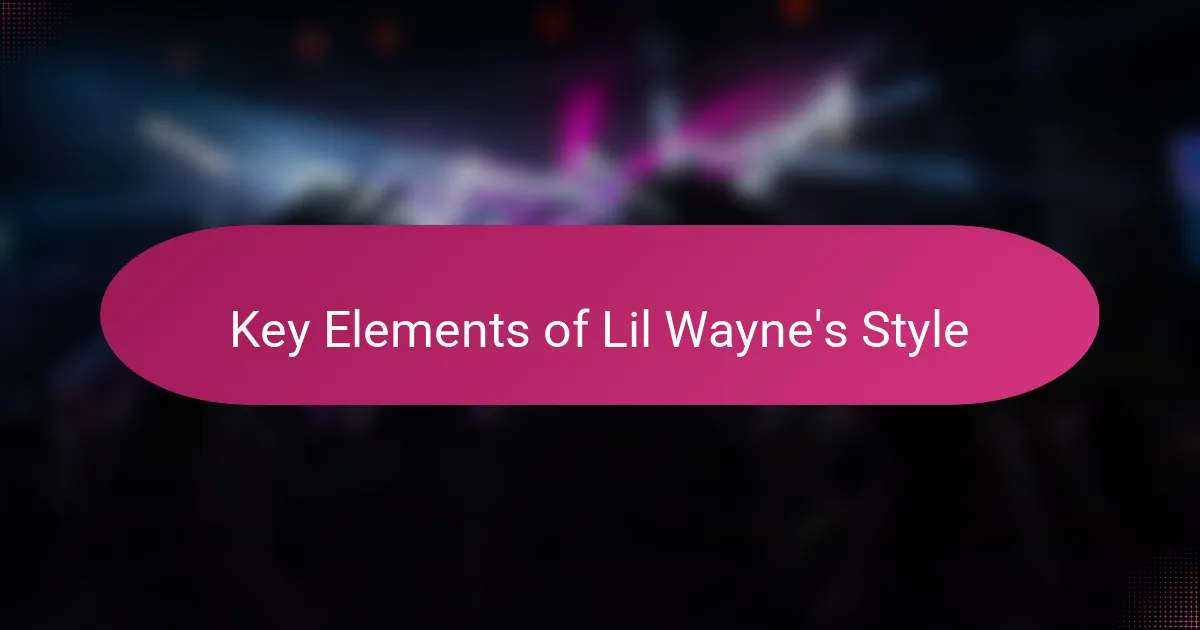
Key Elements of Lil Wayne’s Style
One thing that always stands out to me about Lil Wayne’s style is his fearless wordplay. It’s like he’s weaving intricate puzzles with words—sometimes playful, sometimes dark—and you find yourself caught in the rhythm, trying to unravel the layers. Have you ever caught a metaphor from him that made you pause and think harder? That’s the brilliance of his lyrical craft.
Another element I find fascinating is his voice delivery—gritty, sometimes raspy, but always full of emotion. It feels like he’s telling stories directly from his gut, which makes every track hit with authenticity. I remember listening to one of his freestyles and being drawn in not just by what he was saying but by how he said it, as if every syllable carried a weight beyond just the music.
Then there’s his knack for blending bravado with vulnerability, which isn’t easy to pull off. I often think about how this contrast adds a human dimension to his persona, making him more relatable despite the swagger. Can you imagine how that balance influences aspiring artists to embrace their complexities rather than hiding them? For me, that’s one of Lil Wayne’s most enduring contributions to rap style.
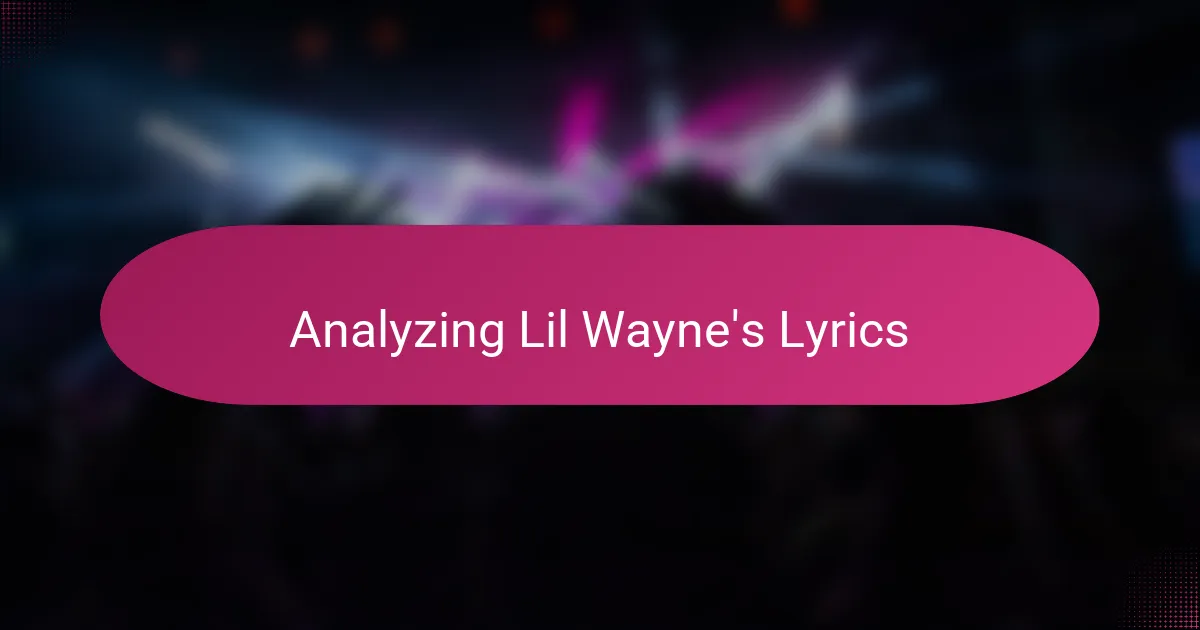
Analyzing Lil Wayne’s Lyrics
When I dive into Lil Wayne’s lyrics, what strikes me first is the sheer density of his wordplay. It’s like he’s constructing these vivid, sometimes surreal pictures with his words, forcing you to slow down and unpack the meaning—almost like a lyrical puzzle waiting to be solved. Have you ever found yourself rewinding a line just to catch the clever double entendre or unexpected metaphor? That’s where his genius really lies.
I’ve often noticed how his lyrics balance raw honesty with swagger, which creates this magnetic tension. One moment, he’s flaunting confidence through punchlines, and the next, he’s dropping lines loaded with vulnerability or introspection. This push and pull resonates with me because it mirrors real human complexity—nothing feels one-dimensional or rehearsed in his verses.
What I appreciate most is how personal and unfiltered his storytelling can be. Listening to Lil Wayne rap about his struggles or ambitions, I feel like I’m getting a window into his world, unvarnished and real. Doesn’t that make his music more than just entertainment—it becomes a dialogue, an intimate exchange where you connect not just with his sound, but his soul?
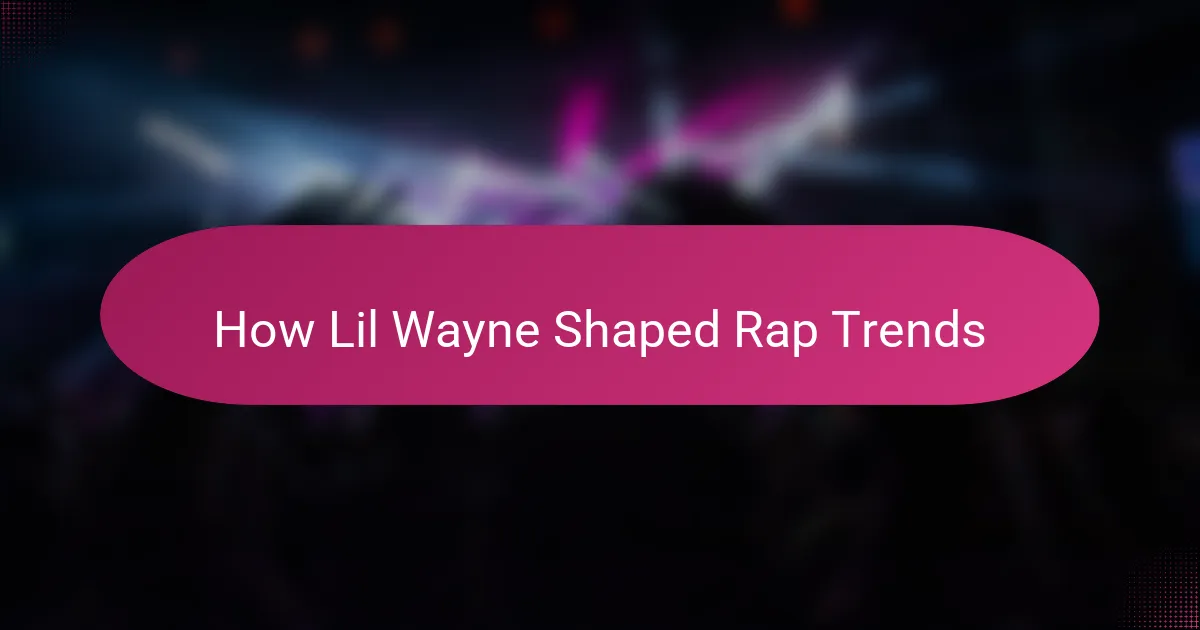
How Lil Wayne Shaped Rap Trends
Lil Wayne didn’t just ride the wave of rap trends—he created new currents that others felt compelled to follow. I remember the first time I noticed how his unconventional flows, like skipping traditional rhyme schemes, made me rethink what rap could sound like. Isn’t it fascinating how an artist’s fearless experimentation can redefine the rules we thought were set in stone?
The way Lil Wayne fused catchy hooks with intricate verses set a blueprint that many rappers would later adopt. His influence seeped into everything from the rise of mixtape culture to the mainstream embrace of auto-tune and melodic rap. From my perspective, that blending of street grit with mainstream appeal was a game-changer that opened doors for artists who didn’t fit the traditional mold.
For me, one of Lil Wayne’s biggest contributions to rap trends was normalizing vulnerability alongside bravado. I’ve always admired how he could switch from aggressive battle raps to introspective lines without losing his edge. Have you noticed how that duality has inspired many artists to be more authentic, blurring the lines between toughness and emotional openness? That shift owes a lot to Wayne’s fearless approach.
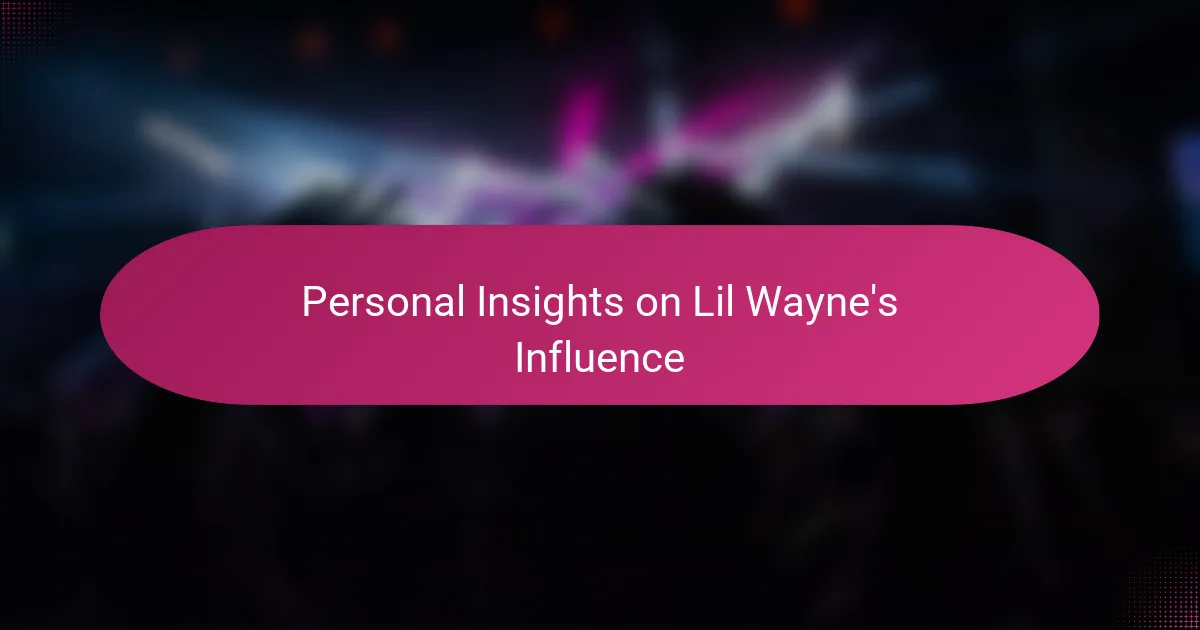
Personal Insights on Lil Wayne’s Influence
When I think about Lil Wayne’s influence on me personally, it’s hard not to reflect on how he challenged my own understanding of creativity. I remember trying to write verses that captured some of his fearless innovation but realizing it wasn’t just about clever words—it was about embracing imperfection and authenticity. That lesson changed the way I approach not just rap, but all forms of expression.
One of the most striking things about Lil Wayne’s influence is how he made vulnerability feel like a strength rather than a weakness. I’ve seen so many artists hesitate to expose their true selves, but Wayne showed me that sharing your flaws and fears could actually elevate your art. Have you ever felt that raw honesty from an artist that pushes you to be more open about your own struggles? That’s the kind of connection he fostered for me.
I also can’t overlook how Lil Wayne’s unpredictability inspired me to break out of my creative comfort zone. His willingness to experiment with sounds, flows, and topics made me ask, “Why shouldn’t I take risks too?” That question has led me down some unexpected but rewarding paths in music and life. In many ways, his influence was a nudge to embrace the unknown with confidence.
